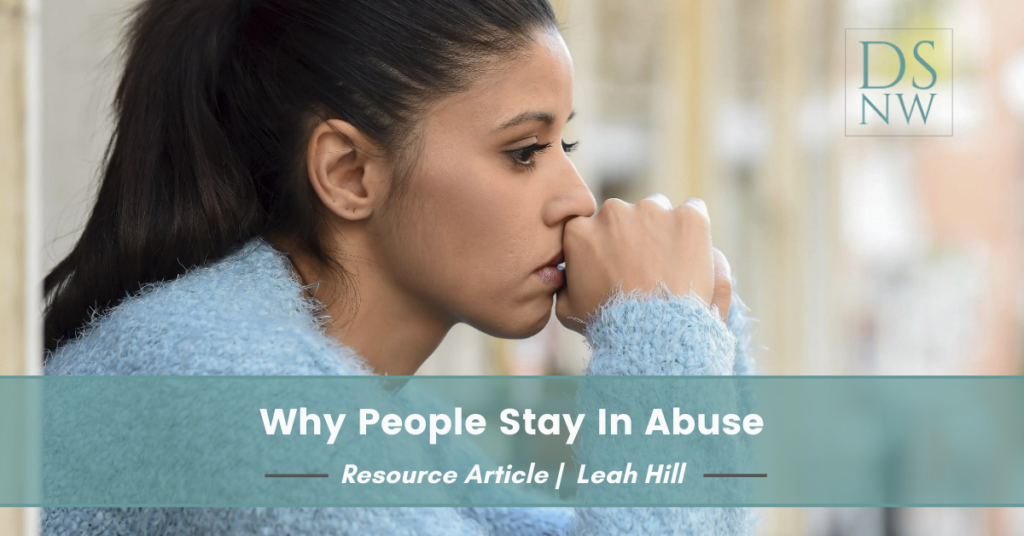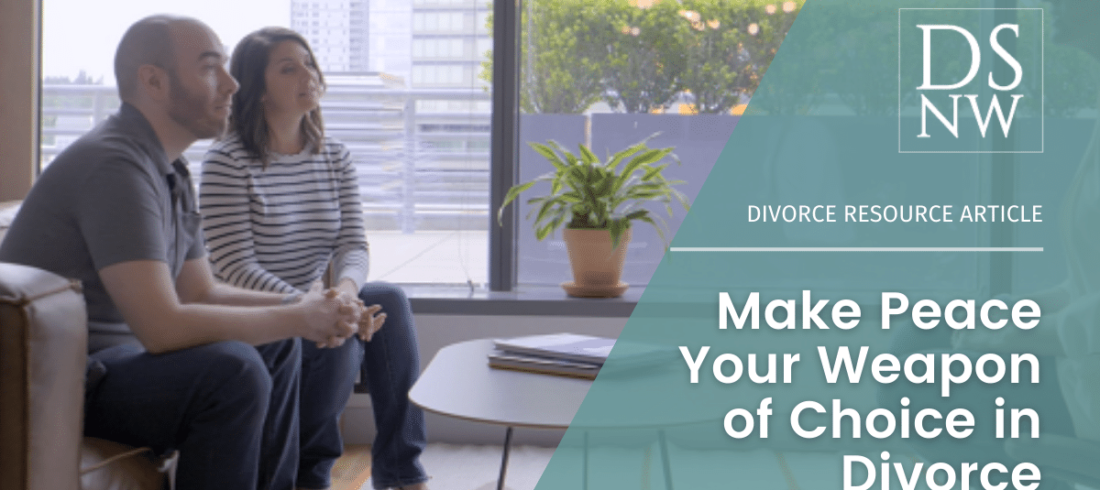
What stops someone from leaving an abusive relationship? Why do some people stay, while some bravely choose freedom?
The decision to leave a marriage is never easy. But when it comes to leaving an abusive relationship, people face even more scrutiny from those around them. Narcissists take great measures to convince outsiders that they are charming, lovable people. Victims are often not believed when they finally disclose abuse and find the courage to leave—after all, everything looks so perfect.
“Why don’t you just leave?”
Many people ask victims of abuse this question. Although often posed with good intentions, this question is rarely helpful. For most victims, the decision of whether to leave a relationship is far more complicated and wrought with more nuances than most people realize.
For people who have never been involved in an abusive relationship, it can be mystifying to imagine how anyone would stay with a partner who treats them badly behind closed doors. It is also very challenging to witness someone you know and love being hurt, and yet continuing to live with the abuser. While leaving an abusive relationship is a good and necessary choice for many victims, there are many reasons why some choose to stay.
1. THREATENED into Silence
Threats come in many forms. Abusers may threaten to expose one of the victim’s secrets. Or, they cut off the victim’s supply to life’s necessities such as cash, a car, access to family, or their ability to work. Abusers will do whatever they can to maintain their position of power and control within the relationship.
In some situations, a victim is faced with even greater harm, should they try to leave. Separation assault occurs when the victim knows that making the choice to exit the relationship can literally become a matter of life and death for them or a member of their family.
2. Who will BELIEVE you?
Leaving a committed relationship is never easy. It can open a lot of questions and conversations from loved ones who are close to the couple, and are naturally curious about why the relationship has changed. When it comes to leaving an abusive relationship, victims face even more scrutiny, which brings on guilt and shame. Because abusers are often narcissists who have taken great measures to make outsiders believe they are charming, lovable people, the victim feels helpless to be believed.
A victim realizes that if they were to try to leave, the narcissistic abuser would intensify the glossy façade of their public image, ensuring that they would not be believed or supported. Victims are often not believed when they try to share about the abuse, or feel they will be blamed for the failure of the marriage. The threat of becoming an outcast during a time when you need support can compel a victim to hide abuse for years.
For this vital reason, believing a victim is vitally important. Just because the abuser seems like a good person and abuse seems hard to fathom does not change the reality of its existence. This is especially true when Covert Emotional Abuse is involved, because by its very nature, it is hard to identify or detect.
What would motivate someone to pursue drastic, painful changes in their life and that of their family, unless they were sharing the truth?
Leah Hill – Founder and CEO | Divorce Strategies Northwest
3. Holding onto HOPE
Many abusers follow-up abusive behavior with a “honeymoon phase.” They try to romance their victim back into their arms by behaving sweetly just long enough to make the victim wonder, maybe he’s changed, she says she won’t lose her cool again, maybe he really is capable of love. The victim often becomes confused and overwhelmed with profound self-doubt, wondering if they are the problem.
The victim wonders… can she learn to communicate more effectively, or perhaps she can find ways within herself to stop the toxic cycle? Can he learn to communicate more effectively, or maybe he can find ways within himself to stop their toxic dysfunction. The victim craves affirmation or loving words and emotions so much that this honeymoon phase makes it worth staying, giving them false hope that things will get better, or that the situation is not really as bad as they thought, when the abuse was active.
This is especially true when the relationship is long-term, and their lives are intertwined with family, finances and a network of friends. Understanding options can be overwhelming. Many victims spend years hoping for change that never comes.
To one who is starving, rotten fruit would seem edible. These crumbs of attention are not healthy nourishment for one’s soul, they are manipulative tools of an abuser.
Leah Hill – Founder and CEO, Divorce Strategies Northwest
4. Nowhere to GO
Leaving a relationship can be costly and time-consuming, especially in instances of divorce. Although you may want to escape the situation, your troubles may not necessarily end, upon cutting ties with the abuser. Although you may want to escape the situation, cutting ties with an abuser is challenging for many reasons.
For example, she may not have worked outside the home for a while, is unable to afford a place to stay on her own, or is unsure how she will be able to support her children on her own. Leaving the relationship introduces new challenges that victims feels intimidated or ill-equipped to face.
This is another reasons why having even just one supportive individual in their life can be a catalyst for courage. Having someone to champion their journey and offer them practical and emotional support is an essential tool they need to leave and succeed.
5. Is Staying BETTER FOR THE KIDS?
A common belief is that it is possibly better, for the children to live with both of their parents in the home, even when one partner is abusing the other, as long as they are not directly abusing the children. However, research has shown that kids who are living in a home where any form of domestic violence is taking place among the adults, even when the parent is not directly abusing the children, often develop significant health-related consequences that affect them during childhood and will last into adulthood.
Research shows that in homes where domestic violence is present, including emotional abuse, a two-parent home with the abuser is not ideal for children. These homes do not show children healthy role-modeling, conflict resolution, and positive interaction(s) within a family.
Supportive phrases like, “I’m so sorry you’re going through this,” “I’m here for you if you want to talk,” and “What can I do to help you right now?” are what victims need to hear, as they bravely forge ahead towards freedom from abuse. These are scary times of uncertainty; victims need all the love, support and security you can offer.
Emotional abuse is domestic violence
Domestic violence is caused by sexism, entitlement, and a history of allowing abuse to continue. Abuse is a choice. Narcissistic personality disorder means an abuser has two problems—choosing to control and choosing to abuse their partner.
Controlling people know how to fly under the radar and how to make themselves look good. They are often very skilled in manipulating their victims into thinking that their friends and family are wrong, jealous or overprotective. Controlling people often leave trails of “evidence,” to convince their victim(s) and their community that they are good partners, and to fool you into thinking that they have your best interests at heart. In reality, this is all part of the abuser’s “show.”
Promoting Healing + Freedom
As a society, we must receive and believe a victim’s disclosure of abuse. This creates a shift in domestic violence counsel and care, and provides a pathway to healing. Our team prevents compound abuse by promoting trauma-informed and compassionate responses, and refusing to permit first responders to disbelieve, shun, silence, or mock a victim who courageously speaks out about the abuse they are enduring.
We provide tools to hear victims while promoting clarity, empowerment, accountability and restoration. We dispel ignorance and lies denying Covert Emotional Abuse, a dangerous and common form of Domestic Violence, which significantly harms its victims, and extends the abuser’s reach into extended family and their community. Children living in violent homes, even if not directly abused, can experience mental, physical, and/or psychological impairment that affects development and can last into adulthood.
Choosing to leave security requires information and support. Pursuing freedom requires facing hard truths, breaking patterns and causes initial discomfort. This discomfort typically resolves once a victim feels the warm bath of safety in living free from abuse. By stemming the tide of domestic abuse through education and support, we protect families and foster healthy environments in which all individuals can thrive.
Your Trusted Partner
Whether you’re contemplating a divorce, have already started the process, or are far into the proceedings, do you wish you had someone to share with you the inside scoop on how to save money, time and emotional energy on your divorce?
Our team is available for a complimentary consultation to discuss the many scenarios, options and implications of separation or divorce, via telephone or videoconference during this time. Feel free to get in touch with us; we are here for you!




